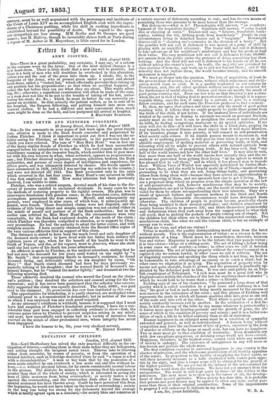THE SMYTH AND FLETCHER FORGERIES.
25 Surrey Street, Strand, 18th August 1853. SIR—In the comments in your paper of last week upon the great Smyth case, allusion is made to the Bank frauds concocted and perpetrated by Joshua Fletcher. I think it important to point out that I was not the so- licitor acting for Fletcher, or for the claimant, in the particular fraud to which you have referred. The case of " Miss Mary Hunt" was in fact one of the many similar frauds of Fletcher in which he had been successfully engaged before his introduction to my office. You well remark upon the ex- traordinary cunning of the impostor Smyth, which enabled him to pass mus- ter with his own lawyers in what, when reviewed, appears so preposterous a case ; but Fletcher deceived registrars, proctors, solicitors, brokers, the Bank authorities, and persons of every degree of intelligence and experience, for fifteen years, and was ultimately detected by chance. His frauds appear to have commenced in 1828, (whilst I was serving my articles in the country,) and were not detected till 1843. The Bank prosecuted only in the cases which occurred in the last four years. Mary Hunt's case occurred in 1838. I was first employed in 1840. How many attornies had been previously deceived, I am unable to state.
Fletcher, who was a retired surgeon, devoted much of his time to the dis- covery of persons entitled to unclaimed dividends. In many cases he was the medium of restoring property to the righful owners. His plan was to interweave fraudulent with genuine cases; in the fraudulent cases, different accomplices personated the true owners. Myself, and subsequently my partner, were employed in nine cases, of which four, it subsequently ap- peared, were frauds. These fraudulent claims were not disputed, and the evidence of title being direct and simple, suspicion was not excited either in the minds of myself and partner or of the Bank authorities; but in the earlier case referred to, Miss Mary Hunt's, the circumstances were very remarkable, for the Bank had expressed doubts of the truth of the claim ; which Fletcher was therefore compelled to abandon, or to support by Chan- cery proceedings. He had the audacity to adopt the latter course, and with complete success. I have recently obtained from the Record Office copies of the very curious affidavits filed in support of this claim.
The claimant is stated to have been the much loved and only daughter of the deceased stock-owner ; to have lived with her father from infancy till eighteen years of age, when for the benefit of his health he went to the South of France, and she, at his request, went to America, where she staid until she had news of his death ten years afterwards.
An affidavit is made by Fletcher, as the medical attendant, stating that he had not seen the deceased for ten years until waited on one night by "a Mr. Smith" ; that accompanying Smith to deceased's residence, he found deceased dying, and deliriously calling on his daughter by name, "Oh Mary !" that Smith stated deceased had been for days previously re- peatedly talking of his daughter ; that he warned Smith of deceased's im- minent danger, but he "treated the matter lightly," and deceased at two the following morning died.
These affidavits deceived the counsel who moved the Court on the claim- ant's petition ; they deceived the solicitors and counsel acting for the Go- vernment; and it has never been questioned that the solicitor who success- fully supported the claim was equally deceived. The fund, 45001., was paid over to the claimant. Ho prosecution has ever been instituted in this case.
The opportunities for blundering, it is justly observed, are multiplied when elaborate proof to a demonstration is demanded; but in neither of the cases in which I was employed was any such proof required. As my attorney's certificate is withheld, because it is supposed that I must have had suspicion of Fletcher's fraudulent proceedings, I have for a con- siderable time past been engaged in collecting evidence to show—first, the extreme pains taken by Fletcher to prevent suspicion arising in my mind; and next, how successfully such means had in a variety of instances been exerted on the minds of other professional men, whose integrity has never been impugned. I have the honour to be, Sir, your very obedient servant,
W. IIrsny BARBEL
























 Previous page
Previous page